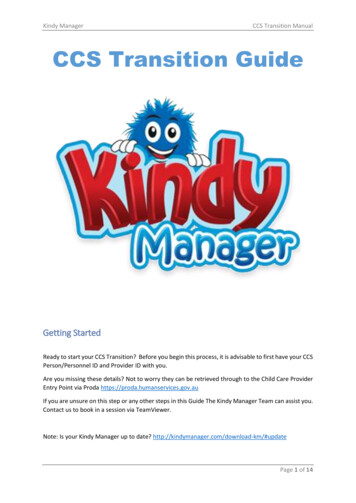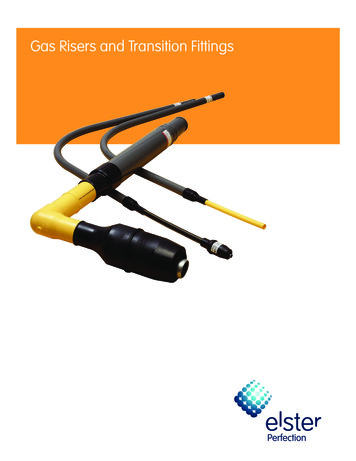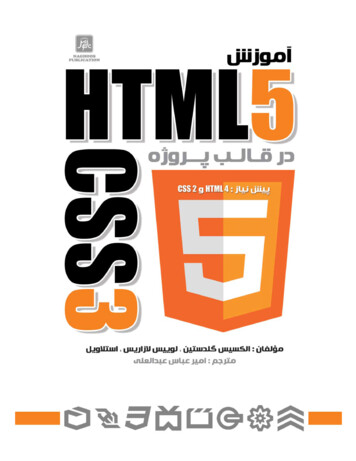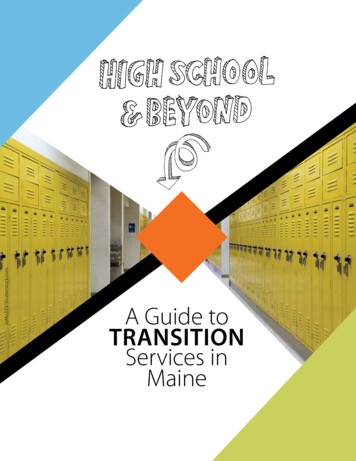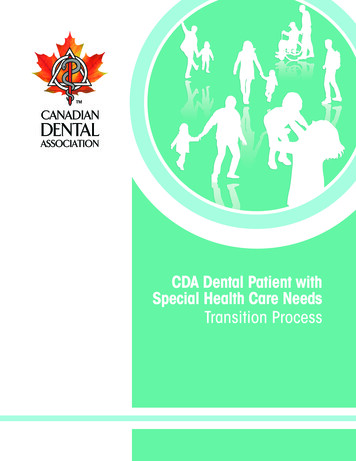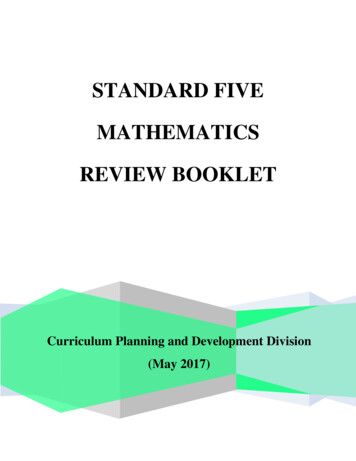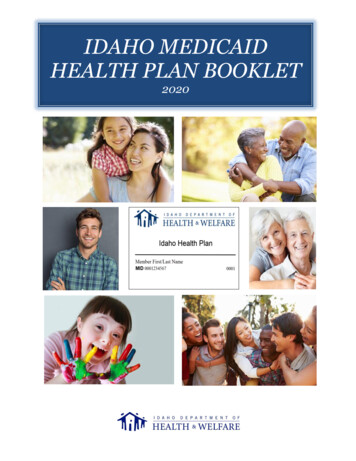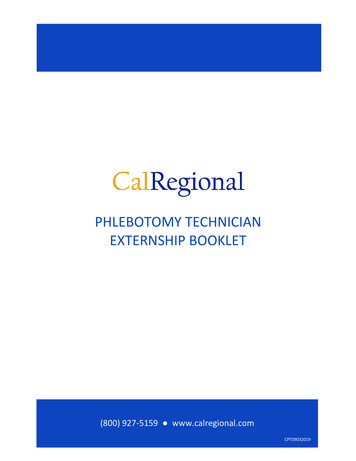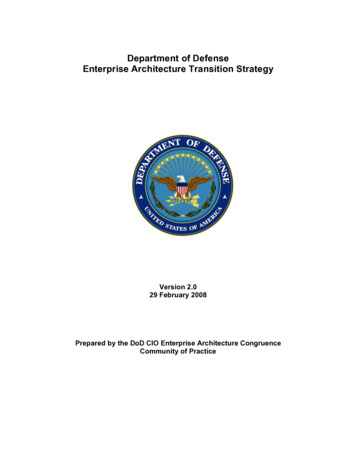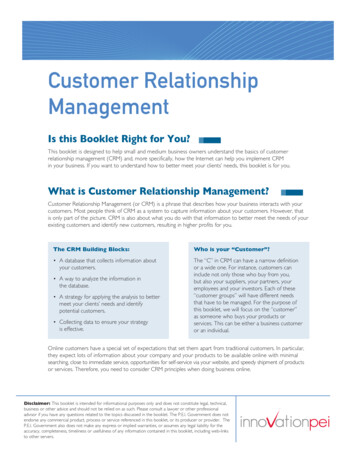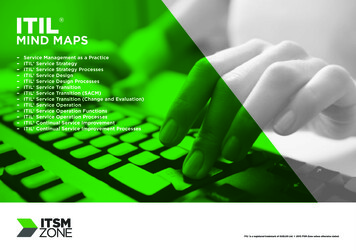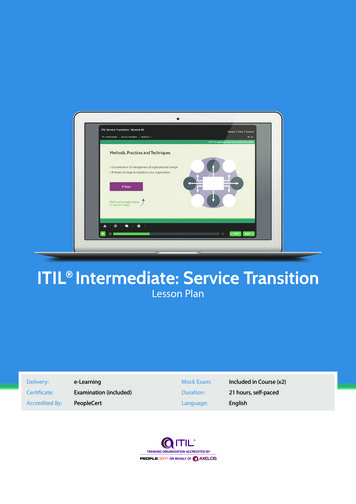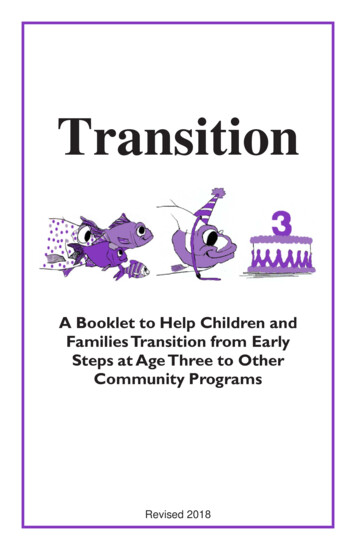
Transcription
TransitionA Booklet to Help Children andFamilies Transition from EarlySteps at Age Three to OtherCommunity ProgramsRevised 2018
This publication is produced through the Bureau of ExceptionalEducation and Student Services (BEESS) Resource and InformationCenter (BRIC), Division of Public Schools, Florida Department ofEducation (FDOE), and is available online at http://www.fldoe.org/ese/pub-home.asp. For information on available resources, contactthe BRIC.BRIC website: http://www.fldoe.org/ese/clerhome.aspBEESS website: http://www.fldoe.org/ese/Email: BRIC@fldoe.orgTelephone: 850-245-0475Fax: 850-245-0953The FDOE, BEESS, through federal assistance under the Individualswith Disabilities Education Act (IDEA), Part B, provided funding toFlorida’s Transition Project through the Technical Assistance andTraining System (TATS) Project for development of this publication.
Table of ContentsPurpose . 1Questions and Answers . 2Programs that May Be Available in Your Community . 9Resources .15Family Transition Checklist .16Alphabet Soup of Acronyms .17Websites.18Tips to Help with Transition.21Books to Read to Your Child.22Important Names and Numbers .23Notes.23
PurposeThis booklet is designed to assist families who have young childrenwith disabilities and special needs move from one agency or programto another. Moving from program to program is called transition.Families and agencies or programs working with families havefrequently asked Florida’s Transition Project staff for a booklet thatprovides an overview of what takes place when a child turns threeyears old and leaves Early Steps to attend other community programs.This booklet includes questions family members have asked abouttransition. It also includes descriptions of many statewide programsthat may be available in your own community.Visit Florida’s Transition Project website athttp://www.floridatransitionproject.ucf.edu/ to download a copy ofthis booklet and other resources.1
Questions and AnswersQ:Why does my child have to leave Early Steps(transition) by his or her third birthday?A:According to federal law — IDEA2004, Part C — after age 36months, your child is no longereligible for Early Steps. Your childmay not qualify for the sameservices from the school districtthat he or she received in EarlySteps because of different eligibilityrequirements; however, you will bepart of a team that makes decisions for your child. Yourchild may be eligible for a school district PrekindergartenProgram for Children with Disabilities under IDEA, Part B,or for other early learning services in your community.Q:What are the steps in the transition process?A:The following information will help you plan for your child’stransition. Your service coordinator will discuss transitionthroughout the time your child receives services withEarly Steps. Not fewer than 90 days prior to your child’s thirdbirthday, Early Steps must notify the Department ofEducation and the school district PrekindergartenProgram for Children with Disabilities that your child ispotentially eligible for services. This information helpsthe school district plan for services for your child;however, you will have the option to opt-out of havingnotification information shared at that time. Early Steps must hold a transition conference by thetime your child is two years and nine months of age ifyour child is potentially eligible for school district2
services. Early Steps will make a reasonableeffort to hold a transition conference ifyour child is not potentially eligible forschool district services.Q:What role(s) can a family member play in thetransition process?A:Family members may: Participate in scheduled meetings Make decisions about what you want for your child andshare it at the meeting Take your child to appointments for vision and hearingscreenings, developmental evaluations and physicalexaminations Provide required documents for enrollment, such asproof of residency, birth certificate, immunization recordand physical examination record Give written permission/consent for exchange ofinformation between agencies or programs Visit community programs you are considering for yourchildQ:What can I do to make sure the transition process isworking for my child?A:You can ask questions such as: What is the next step in the process? Who will contact me after the transitionconference?3
In addition, you can contact your service coordinator orlocal Early Steps office if a timeline isn’t being met.Q:Who participates in the transition conference?A:Required transition conference participants include you andyour service coordinator. The service coordinator isrequired to invite the school district representative to theconference, with your approval, if your child is potentiallyeligible for the Prekindergarten Program for Children withDisabilities. With your approval, other participants who maybe invited include representatives from the program whereyour child is currently being served. You may also ask yourservice coordinator to invite a representative from thefollowing agencies or programs: Early Steps service providers Head Start Community child care Children’s Medical Services Agency for Persons with Disabilities Florida Diagnostic and Learning Resources System(FDLRS) Other individuals or agency representatives of yourfamily’s choice (e.g., Prescribed Pediatric Extended Care[PPEC])4
Q:What happens at the transition conference?A:At the transition conference, the Early Steps servicecoordinator will facilitate discussion of: Services available from the local school district How and when evaluations and eligibility determinationwill occur Other agencies and community providersthat may assist your child and family Existing child/family information Family concerns regarding transition Strategies to address identified concerns Activities that need to be completedbefore your child moves into the newsetting Persons involved in completing identified activitieswritten on the IFSP Timeframes for when each activity should be completed Need for scheduling visits to program sitesQ:What happens after the transition conference?A:The activities written on the transition plan will becompleted by the individuals listed. For example, yourservice coordinator may arrange for your family to visit aprogram or school.5
Q:What are some other questions I should ask as mychild transitions?A:Once you know the programfor which your child is eligible,you might want to askquestions such as thefollowing: What kind of forms or paperwork will I need tocomplete? What kind of educational plan will be written for mychild? If my child is eligible for any program, will my child and Ihave an opportunity to visit the classroom, program orschool? How many teachers and aides will be in the classroom? How many children will be in the classroom? Will my child participate with children who do not havea disability? How long is the school day or class, and what is the dailyroutine of the program? In what way will accommodations (such as specialnutrition) be made to help my child learn? What kinds of skills will my child need to have toparticipate?6
Q:What program options do I have for mychild after his or her third birthday?A:There may be many programs in yourcommunity that can meet your child’s needs,such as: Public and private child care centers/preschools or avariety of school readiness settings Family child care homes A school district Prekindergarten Program for Childrenwith Disabilities Other programs available in your communityThese programs may include new policies, procedures andrules for both your child and your family. They may alsoinvolve differences in eligibility. For instance, your child maynot qualify for the same services from the school district thathe or she received in Early Steps because of differenteligibility requirements or ways of providing specialeducation and related services.In addition, there may be different staff, schedules andexpectations for both you and your child. Finding out aboutthese differences in advance and asking questions about howthey will affect your child and family will help you and yourchild with your transition experience.7
Q:What is the process for accessing school districtPrekindergarten Program for Children withDisabilities services?A:The school district process is as follows: Your child is evaluated to determine if he or she is You will be invited to attend a meeting to reviewevaluation information. For eligible children, an individual educational plan (IEP)is written and must be implemented by your child’s thirdbirthday. You must be invited to the IEP meeting, andyou may request that the school district invite others,including the Early Steps service coordinator, arepresentative from the program where your child hasbeen receiving services or any additional persons youwould like to have participate. Services will begin as written in the IEP.Q:How can I find information about other programsavailable in my community for children withdisabilities and special health care needs?A:Your service coordinator or family resource specialist canassist you with current resources, available programs andinformation.8
Programs that May Be Availablein Your CommunityThe programs described on the following pages may be available toprovide services in your community once your child has turnedthree years old.Agency for Persons with Disabilities (APD)The Agency for Persons with Disabilities assistspeople who have developmental disabilities andtheir families or guardians. Developmental disability isa broad term that refers to a variety of conditionsthat interfere with a person’s ability to function ineveryday activities. Developmental disabilitiesinclude spina bifida, autism, cerebral palsy, Downsyndrome, Prader-Willi syndrome and intellectual disability.In addition, the APD serves children who are four and five yearsof age and are at high risk of a developmental disability.APD administers the Developmental Disabilities Home andCommunity-Based Services (DD/HCBS) waiver, the Family andSupported Living (FSL) waiver and the Consumer Directed Care Plus(CDC ) program. Services within these programs are subject to theavailability of funding and may include consumable medical suppliesand respite care. For further information, families should contact thelocal APD area office.http://apd.myflorida.com/Department of Children and Families (DCF)Child Care Services Program OfficeThis office is responsible for the administration of child care licensingand training statewide. The program ensures that children are wellcared for in a safe, healthy, positive and educational environment bytrained, qualified child care staff. Currently, the program regulateslicensed child care facilities, licensed family day care homes and9
licensed large family child care homes. In addition, the Child CareServices Program office administers the regulation of family day carehomes not required to be licensed.http://www.myflfamilies.com/Department of Education (DOE)Division of Blind Services, Blind Babies and Children andFamilies ProgramBlind Babies ProgramThe Blind Babies Program promotes early development of life skillsand places emphasis on the development and use of functional visionskills or use of all other senses in order to minimize developmentaldelays. The program is designed to help children with visualimpairments progress through the normal stages of development.Early intervention services offered through the Blind Babies Programare delivered by non-profit community rehabilitation providerswhenever possible, through contracts funded by the Blind BabiesGrant.Children and Families ProgramThis program provides services for children from birth to 21 years ofage who have a diagnosed bilateral visual impairment that will affectthe child’s ability to learn or to function independently in the homeor school. Successful outcomes enable children to transition frompreschool to school or other appropriate community programs.Prekindergarten Program for Children with DisabilitiesSpecially designed instruction and related servicesfor prekindergarten children, three through fiveyears of age, with disabilities are part of theexceptional student education program offeredthrough Florida’s local school districts. Once achild is determined to be eligible, an IEP must bedeveloped and implemented.10
If the child is transitioning from Early Steps, the IEP must be writtenand implemented by the child’s thirdbirthday.http://www.fldoe.org/Office of Early Learning (OEL)The Office of Early Learning is responsible for administering theChild Care Resource and Referral Network (CCR&R), SchoolReadiness (sometimes referred to as child care assistance) and theVoluntary Prekindergarten (VPK) Education Programs. OEL isdedicated to ensuring the accessibility, affordability and quality ofearly learning services for Florida’s children and families.http://www.floridaearlylearning.com/Child Care Resource and Referral NetworkThe state CCR&R Network is dedicated to helping families find outhow to identify quality child care and early education programs andhow to locate a provider that meets the needs of each family. LocalCCR&R specialists can generate referrals to child care providers andother service providers in your community that may meet the needsof your family. The CCR&R Network can provide you withinformation on state or federally funded early learning programs suchas School Readiness, Early Head Start, Head Start and Even Start.Your local CCR&R can also provide you with creative financialassistance options and community resources that may ease yourfinancial burden.The School Readiness ProgramThe School Readiness program offers qualified parents financialassistance for child care through a variety of services. Child careservices include extended-day, extended-year and school-age care tosupport parents in becoming financially self-sufficient.The School Readiness program takes into account the level ofphysical, social, emotional and intellectual development of your child;involves parents as their child’s first teacher; prepares children tobecome ready for school; and provides parents with information on11
child development and other topics of interest. By assuming themajority of the family’s child care expenses, the School Readinessprogram offers financial assistance to eligible families if: Your family is participating in the welfare transition programYou are a migrant farm worker with childrenYou are a teen parentYour family is served by the Family Safety Program Office ofDCFYour children need child care to minimize the risk of furtherabuse, neglect or abandonmentYou have children with disabilities or special needsYou have children from birth to four years of age who are at riskof future school failure and who are served at home throughhome visitor programs and intensive parent education programsYour family’s income does not exceed 150 percent of the federalpoverty guidelinesVPK Education ProgramThe VPK Education Program is designed to prepare four-year- oldchildren for kindergarten and lay the foundation for their educationalsuccess. VPK is free for all of Florida’s four-year-olds born on orbefore September 1 of each year. The VPK program’s qualitystandards include: Qualified instructorsStrong emphasis on early literacyskillsAge-appropriate curriculaManageable class sizesGiving parents a wide selection of choices is a priority, so bothprivate and public providers participate. VPK providers may set theirown schedules to provide the required hours for either program:12
School Year Program—540 teaching hours: class sizes of 20 orfewer students; instructors must have a minimum of a ChildDevelopment Associate (now referred to as the Birth to FiveFlorida Child Care Professional Credential)Summer Program—300 teaching hours; classsizes of 12 or fewer students; instructors musthave a minimum of a bachelor’s degree in aspecified areaSpecialized Instructional Services (SIS)—A non-traditional VPK program for children withdisabilities who have a current IEP. SIS servicesare delivered by providers approved by theFlorida Department of Education and likelydelivered in a non-classroom pxEarly Head Start/Head StartHead Start is a group of federally funded child developmentprograms for children from birth to mandatory school age. EarlyHead Start serves pregnant women and children from birth to agethree; Head Start serves children from three to five years old; andMigrant and Seasonal Head Start serves children from six weeks oldto school age.Of the participating families, 90 percent must have incomes at orbelow the national poverty guidelines. Head Start is also mandatedto provide at least 10 percent of its enrollment to children withdisabilities. The full range of services provided to all childrenparticipating in the Head Start program includes: High-quality early childhood education in inclusive settingsHealth services—including medical, dental and mental health—and nutrition counselingFamily services and parent engagement activitieshttp://www.floridaheadstart.org/13
Florida Diagnostic and Learning Resources System (FDLRS)Nineteen FDLRS centers throughout the state provide freescreening for children who might not be keeping pacedevelopmentally with other children their age in walking, talking,hearing, seeing, understanding or behaving. FDLRS may help provideevaluations for individual children who are nearing three years ofage, are leaving Early Steps and who might enter school systemprograms for children with disabilities.http://www.fdlrs.org/Florida MedicaidFlorida Medicaid is the medical assistance program that providesaccess to health care for low income families and individuals.Children may be eligible for programs such as Child Health CheckUP, which includes a physical exam, immunizations (shots), vision andhearing checks and other tests and services.Florida KidcareKidcare is a children’s health insurance program for children birth to19 years who meet income and eligibility requirements. Childrenmay be enrolled in Medikids, Healthy Kids or Children’s MedicalServices Network if they do not qualify for Medicaid.https://www.floridakidcare.org/Florida School for the Deaf and the Blind (FSDB)/ParentInfant Program – Deaf/Hard of HearingFSDB offers a statewide program for Florida families who havechildren birth to 5 years with a documented hearing loss or bilateralvision loss, with services provided in the family’s natural environmentand daily routines. Emphasis is on language development,communication options, understanding hearing aids, cochlearimplants, literacy, child development and transition into a schoolsystem.http://www.fsdb.k12.fl.us/14
ResourcesFamily Support SystemsChildren and their families/caregivers have several options forreceiving parent-to-parent support during the transition process.Listed below are some supports for families:Family Resource Specialists (FRS)Family Resource Specialists are individuals employed by the localEarly Steps offices to assist families with all areas of earlyintervention, including ites/cmskids/early steps directory/Local Support NetworksCenters for Autism and Related Disabilities (CARD), Central FloridaParent Center, Family Network on Disabilities (FND), Parent toParent of Miami and others are available to provide assistance,support and information regarding transition.15
Family Transition ChecklistIn addition to your questions and concerns, consider bringing thefollowing to your meetings:oA certified copy of your child’s birth certificateoA current copy of reports for any therapy/ developmentalevaluations, vision and hearing screenings, etc.oA current copy of the individualized family support planoYour child’s physical exam forms, including immunization forms,current within one yearoYour most recent utility bill, as proof of your residenceoThe names, addresses and phone numbers of emergencycontactsoSigned, written permission/consent for exchange of informationbetween agenciesoThe name, address and phone number of your child’s physicianand dentist16
Alphabet Soup of NAEYCNECTACAmericans with Disabilities ActAgency for Health Care AdministrationAgency for Persons with DisabilitiesAutism Spectrum DisordersAgency for Workforce InnovationBureau of Exceptional Education and StudentServicesCenter for Autism and Related DisabilitiesChildren’s Medical ServicesDivision of Bind ServicesDepartment of Children and FamiliesDevelopmentally DelayedDepartment of EducationDepartment of HealthEarly StepsExceptional Student EducationFree Appropriate Public EducationFamily Care CouncilsFlorida Diagnostic and Learning Resources SystemFlorida Interagency Coordinating Council for Infantsand ToddlersFamily Network on DisabilitiesFamily Resource SpecialistFlorida School for the Deaf and the BlindIndividuals with Disabilities Education ActIndividual Educational PlanIndividualized Family Support PlanLocal Educational AgencyLeast Restrictive EnvironmentNational Association for the Education of YoungChildrenNational Early Childhood TechnicalAssistance Center—now Early Childhood TechnicalAssistance (ECTA) Center17
nal Dissemination Center for Children withDisabilitiesOffice of Early LearningOffice of Special Education Programs(U.S. Department of Education)Prescribed Pediatric Extended CareResource and ReferralService CoordinatorSocial Security AdministrationSupplemental Security IncomeTemporary Assistance for Needy FamiliesVoluntary Prekindergarten Education ProgramVPK Special Instructional ServicesWomen, Infants and Children Special SupplementalNutrition ProgramWebsitesAgency for Persons with Disabilitieshttp://apd.myflorida.com/Americans with Disabilities Acthttps://www.ada.gov/Bureau of Exceptional Education and Student -studentedu/index.stmlCenters for Autism and Related Disabilitieshttp://florida-card.org/18
Central Florida Parent l for Exceptional Children, Division for EarlyChildhoodhttp://www.dec-sped.org/Division of Blind Serviceshttp://dbs.myflorida.com/Early Childhood Technical Assistance Centerhttp://ectacenter.org/Early mskids/early steps directory/ERIC Clearinghouse on Elementary & Early Childhood Educationhttps://eric.ed.gov/Family Network on Disabilities of Florida, Inc.http://fndusa.org/Florida Department of Children and Familieshttp://www.myflfamilies.com/Florida Department of Educationhttp://www.fldoe.org/Florida Diagnostic and Learning Resources Systemhttp://www.fdlrs.org/Florida’s Head Start State Collaboration Officehttp://www.floridaheadstart.org/Florida Kidcarehttps://floridakidcare.org/Florida School for the Deaf and the Blindhttp://www.fsdb.k12.fl.us/19
Florida’s Transition Project for Infants, Young Children and cf.edu/National Association for the Education of Young Childrenhttps://www.naeyc.org/Parent to Parent of Miamihttp://www.ptopmiami.org/State of Floridahttp://www.myflorida.com/Technical Assistance and Training Systemhttp://tats.ucf.edu/Voluntary Prekindergarten Education xZero to Three/National Center for Infants, Toddlers and Familieshttps://www.zerotothree.org/20
Tips to Help with TransitionThe following tips may help you and your child prepare fortransition: Complete a helpful information sheet about your child, such as“Getting to Know Me My Family,” which can be found on thewebsite at http://www.floridatransitionproject.ucf.edu/.This form can help the staff at your child’s new setting learn allabout your child. Talk about the new setting in positive ways with your child andother family members. Contact the teacher in the new setting and arrange to meet todiscuss daily routines, schedules, curriculum and any medicalneeds your child may have while participating in the program. Ask questions about such topics as your child riding on a schoolbus, playground participation, the amount of services to beprovided, how therapies will be provided and nap time rules. If possible, visit the new setting to talk with the teacher and seethe room. Talk with your child about the things that are the same and thethings that are different about the current program and the newone. Involve your child in group experiences, such as the story hourat your local library.21
Books to Read to Your ChildThe books listed below are about going to school or startingsomething new. These and other books may be found in yourcommunity library or bookstore.Bernard Goes to School, by Joan Elizabeth GoodmanBilly and the Big New School, by Laurence AnholtBusy at Day Care, by Patricia DeMuthEmily’s First Day of School, by Fran SchillerFirst Day Jitters, by Julie DannebergFroggy Goes to School, by Jonathan LondonHello School, by Dee LillegardI’ll Go To School If , by Bo FloodLittle Cliff ’s First Day at School, by Clifton L. TaulbertLittle Monster Goes to School, by Alison InchesMoses Goes to School, by Isaac MillmanOff to School, Baby Duck! by Amy HestSpecial People, Special Ways, by Arlene MaguireSusan Laughs, by Jeanne WillisTimothy Goes to School, by Rosemary WellsVera’s First Day of School, by Vera Rosenberry22
Important Names and NumbersNotes23
a Department of EducationPam Stewart, CommissionerRevised 2018311662
Agency for Persons with Disabilities (APD) The Agency for Persons with Disabilities assists people who have developmental disabilities and their families or guardians. Developmental disability . is a broad term that refers to a variety of conditions that interfere wi
